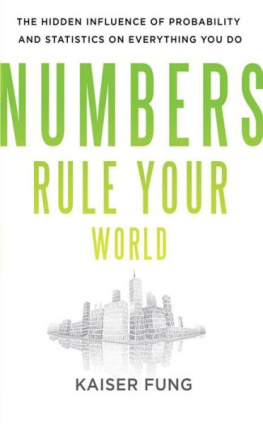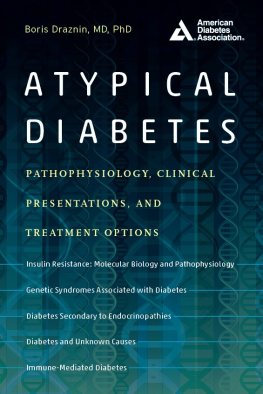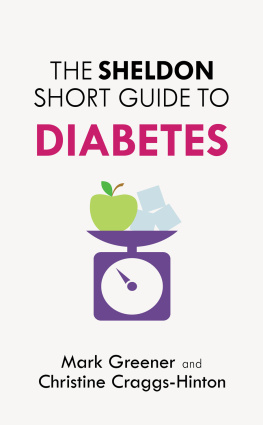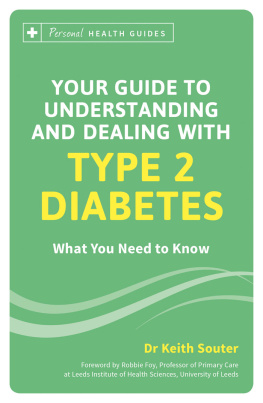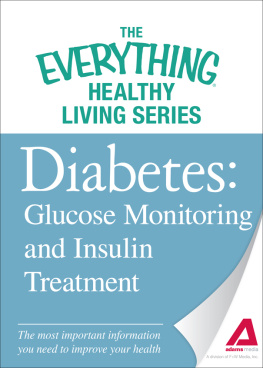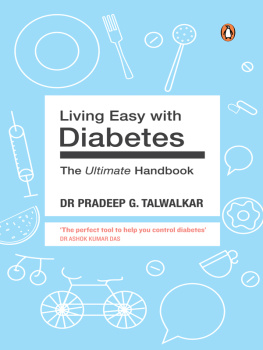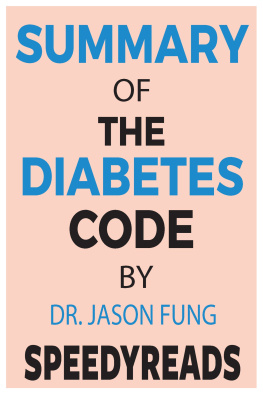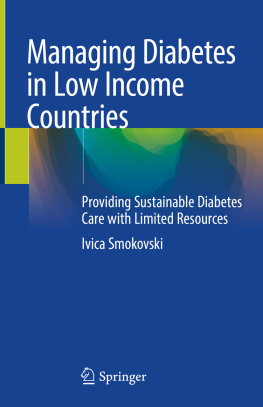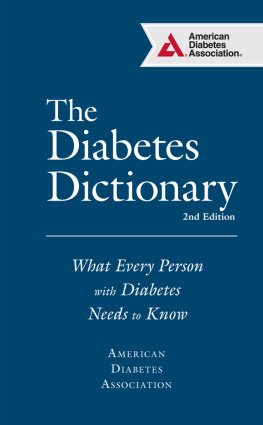Advance praise for The Diabetes Code
By understanding the underlying cause of the disease, Dr. Fung reveals how [type 2 diabetes] can be prevented and also reversed using natural dietary methods instead of medications. This is an important and timely book. Highly recommended.
MARK HYMAN, MD, author of Food: What the Heck Should I Eat?
With rich scientific support, Dr. Jason Fung has sounded a clarion call to re-evaluate how we view and treat diabetes. Considering that roughly half of all adults worldwide are diabetic or on their way (pre-diabetes), The Diabetes Code is essential reading.
DR. BENJAMIN BIKMAN, Associate Professor of Physiology, Brigham Young University
In The Diabetes Code, Dr. Fung lays out the case for eliminating sugar and refined carbohydrates and replacing them with whole foods with healthy fats. Dr. Fung gives an easy-to-follow solution to reversing type 2 diabetes by addressing the root cause, diet.
MARIA EMMERICH, author of The 30-Day Ketogenic Cleanse
In this terrific and hopeful book, Dr. Fung teaches you everything you need to know about how to reverse type 2 diabetes. It could change the world.
DR. ANDREAS EENFELDT, author of Low Carb, High Fat Food Revolution
The Diabetes Code should be on the bookshelf of every physician and any patient struggling with blood sugar control.
CARRIE DIULUS, MD, medical director of the Crystal Clinic Spine Wellness Center
The Diabetes Code is unabashedly provocative yet practical... a clear blueprint for everyone to take control of their blood sugar, their health, and their lives.
DR. WILL COLE, leading functional medicine practitioner and educator at drwillcole.com
With his trademark humor, Jason Fung exposes the secret that type 2 diabetes can be reversed with the right combination of diet and lifestyleyou can reclaim your health and vitality. Dr. Fung will teach you how.
AMY BERGER, MS, CNS, author of The Alzheimers Antidote
The Diabetes Code clears the fog around type 2 diabetes and underscores that for most people, it is preventable or reversible.
DR. KARIM KHAN, MD,British Journal of Sports Medicine

Copyright 2018 by Jason Fung
Foreword copyright 2018 by Nina Teicholz
All rights reserved. No part of this book may be reproduced, stored in a retrieval system or transmitted, in any form or by any means, without the prior written consent of the publisher or a licence from The Canadian Copyright Licensing Agency (Access Copyright). For a copyright licence, visit www.accesscopyright.ca or call toll free to 1-800-893-5777.
Greystone Books Ltd.
www.greystonebooks.com
Cataloguing data available from Library and Archives Canada
ISBN 978-1-77164-265-1 (pbk.)
ISBN 978-1-77164-266-8 (epub)
Editing by Lucy Kenward
Copy editing by Lynne Melcombe
Cover and text design by Nayeli Jimenez
We gratefully acknowledge the support of the Canada Council for the Arts, the British Columbia Arts Council, the Province of British Columbia through the Book Publishing Tax Credit, and the Government of Canada for our publishing activities.

I would like to dedicate this book to my beautiful wife, Mina.
You are my guiding star, without which I would be forever lost.
You are my life, my love, my everything.
CONTENTS

FOREWORD

IN JUST A generation, diabetes has gone from rarity to epidemic, a catastrophic turn that presents urgent questions: Why are so many suffering, and so suddenly? And how have our health authorities failed to offer an explanation or treatment for so devastating a scourge, despite spending billions? They have, instead, essentially given up on finding a cure, pronouncing type 2 diabetes a chronic, progressive disease that promises a life of slow, painful decline and early death.
Tragically, diabetes authorities worldwide have come to the consensus that the best hope for sufferers is merely to control or delay the disease through a lifelong dependence on medications combined with medical devices and surgery. There is no emphasis on better nutrition. Instead, some forty-five international medical and scientific societies and associations around the world declared in 2016 that bariatric surgery, which is both expensive and risky, should be the first option for diabetes treatment. Another recently approved idea is a new weight-loss procedure in which a thin tube, implanted in the stomach, ejects food from the body before all the calories can be absorbed, which some have termed medically sanctioned bulimia. And all this is in addition to the basic regimen for diabetes sufferers: multiple medications, which cost hundreds of dollars a month, and which include insulin, a drug that paradoxically often causes weight gain.
These techniques for managing diabetes are expensive, invasive, and do nothing to reverse diabetesbecause, as Dr. Jason Fung explains in The Diabetes Code, you cant use drugs [or devices] to cure a dietary disease.
The groundbreaking idea Dr. Fung presents in these pages is that diabetes is caused by our bodies insulin response to chronic overconsumption of carbohydrates and that the best and most natural way to reverse the disease is to reduce consumption of those carbohydrates. A low-carbohydrate diet for treating obesity is not only being practiced now by hundreds of doctors around the world but is supported by more than seventy-five clinical trials, conducted on altogether thousands of people, including several trials of two years duration, which establish the diet as safe and effective.
Remarkably, the practice of carbohydrate restriction for diabetes dates back more than a century, when the diet was considered standard treatment. According to a 1923 medical text by the father of modern medicine, Sir William Osler, the disease could be defined as one in which the normal utilization of carbohydrate is impaired. Yet soon thereafter, when pharmaceutical insulin became available, that advice changed, allowing a higher-carbohydrate intake to again become the norm.
Oslers idea would not be revived until science journalist Gary Taubes unearthed and developed it into a comprehensive intellectual framework for the carbohydrate-insulin hypothesis, in his seminal 2007 book Good Calories, Bad Calories. And the modern-day clinical model for diabetics was set forth by scientists Stephen D. Phinney and Jeff S. Volek, as well as the physician Richard K. Bernstein.
In an exciting recent development, clinical trial evidence specifically on diabetics is now emerging. As of this writing, at least one trial, involving some 330 people, is underway for the treatment of the disease with a very low-carbohydrate diet. At the one-year mark, researchers found that some 97 percent of patients had reduced or halted their insulin use, and 58 percent no longer had a formal diagnosis of diabetes. In other words, these patients successfully reversed their diabetes simply by restricting carbohydratesfindings that ought to be compared to the official standard of care for diabetics, which states with 100 percent certainty that the condition is irreversible.


